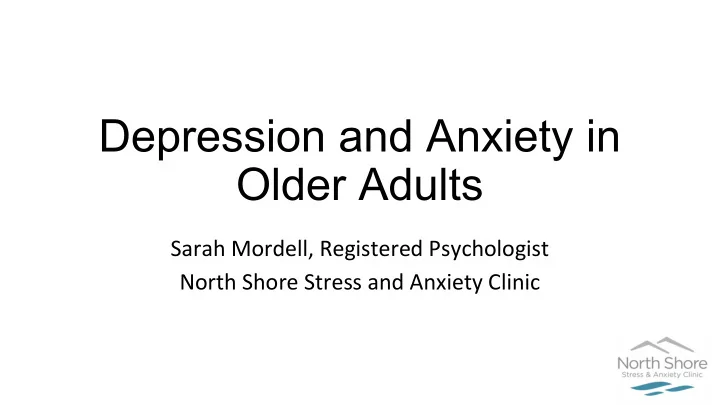

Depression and Anxiety in Older Adults Sarah Mordell, Registered Psychologist North Shore Stress and Anxiety Clinic
Overview • Why a unique focus on older adults? • Recognize symptoms of depression and anxiety • Promote good mental health • When to get help • Know your treatment options • Questions
Why a unique focus on older adults? Diversity Life Phase Stigma Isolation Health
What is depression? • Not “just the blues” • Depression is a syndrome that includes: • Mood • Thoughts • Physical symptoms • The vicious cycle of depression
Signs of depression • At least one (or both) of low mood or loss of interest • Other signs/symptoms: • Fatigue • Social withdrawal • Sleep disturbance • Poor concentration • Neglect personal care • Loss of self-worth (e.g., (e.g., skipping meals) worries of burdening) Mood or other symptoms (e.g., memory deficits) are not just an inevitable part of aging
Depression vs. dementia Dementia Depression • Decline happens slowly • Rapid decline • Confusion and disorientation • Maintains awareness of date, time, and location • Short-term memory problems • Difficulty concentrating • Language, motor impaired • Language, motor slow • Not aware of memory problems • Awareness of memory problems Either way, talk to your doctor!
What is anxiety? • Built-in survival mechanism for realistic dangers • Anxiety performance curve
Signs of generalized anxiety disorder Uncontrollable anxiety Chronic worries Procrastination Problems sleeping Uncertainty intolerance Muscle tension Restlessness Avoidance Problems concentrating
Strategies for good mental health • Treat your mental health like physical health • Take advantage of free resources • give yourself a “check up” • learn strategies to keep in (emotional) shape • Practice, practice, practice! • The nuns study (David Snowdon) • Sister Mary
Mental Fitness: Behavioural Activation • Rationale : Behaviour influences mood; prescribe fun • Activity scheduling – don’t just wait until you feel like it! • Include mastery & pleasurable activities • The upward spiral
Mental Fitness: Goal Setting • Rationale: When feeling low, goal setting can help with motivation • Make goals S pecific M easurable A chievable R elevant T ime-bound
Mental Fitness: Mindfulness • Rationale : Attention is like a muscle; present-focus is key • Exercises of mundane task focus, meditation, body scan, etc. • Can help with pain and mood states
When to get help • Symptoms are: • intense • enduring (more often than not, time periods) • interfering with day to day life • Thoughts of suicide and self-harm
Treatment options - Medication Pros Cons • Inexpensive • May conflict with other medications • Low effort • Possible relapse if medications • Quicker results are stopped • Side effects Speak to G.P. or Psychiatrist
Treatment options – Community MH Pros Cons • Free • Often lengthy waitlists • Benefits can last beyond • Restrictive criteria treatment • May lack choice • Takes time & effort • May limit sessions Speak to G.P. or other community MH staff
Treatment options – Private Cons Pros • Choice • Expense (check extended health) • Convenience • Takes time & effort (12-20 sessions) • Availability • Often lasting benefits • Psychologists are regulated G.P. can refer or self-refer to clinic or individual provider
Key points to take away • Low mood and/or excessive worry are not an inevitable part of aging! • Speak to your doctor sooner rather than later if you experience symptoms • Don’t wait until there’s a problem to start your mental fitness routine • You are a mental health consumer – find a solution/provider that works for you
Free online resources • AnxietyBC • www.anxietybc.com • Mindshift application • Centre for Clinical Interventions • www.cci.health.wa.gov.au • Workbooks for generalized and social anxiety, depression, etc. • Sites to help find private psychologists or counsellors • www.psychologists.bc.ca • www.counsellingbc.ca
Free online resources (continued) • BC Partners for Mental Health & Addictions Information • Workbooks • www.heretohelp.bc.ca • Canadian Mental Health Association • Bounce Back program with free videos and telephone coaching • www.cmha.bc.ca/how-we-can-help/adults/bounceback • Living Life to the Full program with application and sessions • http://www.livinglifetothefull.ca/
Questions?
Recommend
More recommend